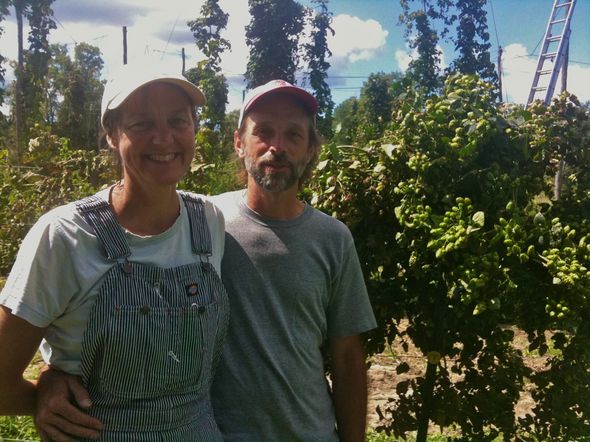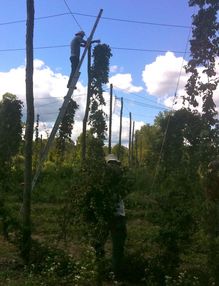Hops Harvest at Knox Hops highlights relationships between local hop growers and Michigan brewers

Linda and Peter Knox in the hop yard
Photo | Kim Bayer
When we arrived at the Knox Hops harvest last Sunday, the cozy scene of a dozen people gathered around a long table and green hop vines silhouetted against the clear blue sky made me think more of Italy than the wilds of southeast Michigan. But we were just outside of Manchester, taking the flower cones off Cascade and Centennial hop vines by hand so that Peter and Linda Knox could deliver 100 pounds of fresh or "wet harvested" hops to Arcadia Ales in Battle Creek before they were 24 hours old.
The hop flower cones are not actually wet — they are dry and papery, and lighter than a feather. But after 24 hours, their ability to add sought after characteristic aroma and bitterness to beer dissipates. So the vast majority of hops are dried in an oast house and then "pelletized" before being delivered to the brewer. They are more shelf stable and consistent in that form.
One of the local brewing enthusiasts volunteering at the hops harvest noted, "What's special about having fresh hops is that it makes a beer with a greener, fresher taste. Beer makers can't usually get fresh hops."
Because Michigan breweries and home brewing enthusiasts are starting to look for locally grown hops (and malted grain), Peter Knox is one of the growers on the forefront of a hops revival in Michigan.
Grown only for the pinecone-shaped flowers from female plants, hops are perennial vines that can produce well for seven to 10 years, according to Knox.
Two years ago, he set 20-foot tall dead ash trees two and a half feet into the ground to form the infrastructure that would hold up the 30 foot vines. He says an acquaintance told him, "Everybody's wondering what you're doing out there. You set up a bunch of poles, and we thought you were putting up a pole barn, but you're doing it all wrong."
In his relatively small hop yard, Peter Knox is currently growing nine different hop varieties and learning which ones produce best in our region.

Bringing down the the hop vines.
Photo | Kim Bayer
Knox and his wife bought the land where he's growing hops, surrounded by 45 acres of wetland, "to keep it from being impacted by another series of houses. The swamp that encircles this area is home to a lot of migratory song birds. To help pay the mortgage on the land, we decided to take an acre of the least hospitable habitat and do something with a relatively low footprint. Hops grow up, so they have that smaller footprint."
Using all-organic methods and materials, Knox says that they are also staying away from mechanized production, because they want to grow their operation slowly, without going into debt as they test out potential markets. One possibility would be diversifying with lots of different varieties for home brewers. But working with Arcadia Ales in Battle Creek is a way to see whether there is an opportunity for contracting with a single brewery for a specific type of hops.
These kinds of hop grower relationships with brewers are springing up all over the state. In northern Michigan, the Michigan Hop Alliance is a cooperative that is setting up certified organic hop processing. They say that their hops have been used by Michigan breweries like Founders, Jolly Pumpkin, New Holland Brewery and Brewery Vivant to make beers like "Hopivore" and "Wet Harvest Ale."
One of the people at the Knox Hops harvest is Manchester Mayor Pat Vailliencourt. She and her husband own Manchester's Black Sheep Tavern on the main street downtown. In a few weeks, they'll be getting two kegs of the Arcadia beer made with Knox Hops.
Peter Knox says "My dream is to work with a local brewery to use my hops to brew a dark beer that would be called Black Sheep Stout. And it would only be available at the Black Sheep Tavern."
Kim Bayer is a freelance writer and culinary researcher. Email her at kimbayer at gmail dot com.

